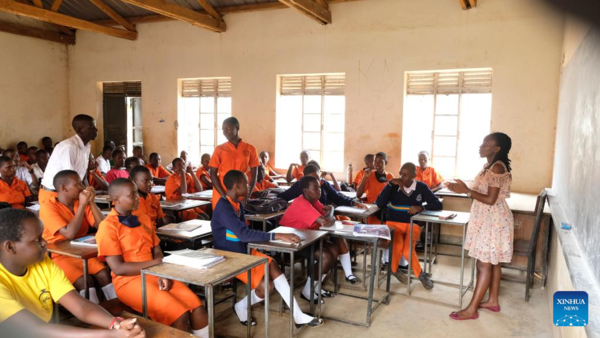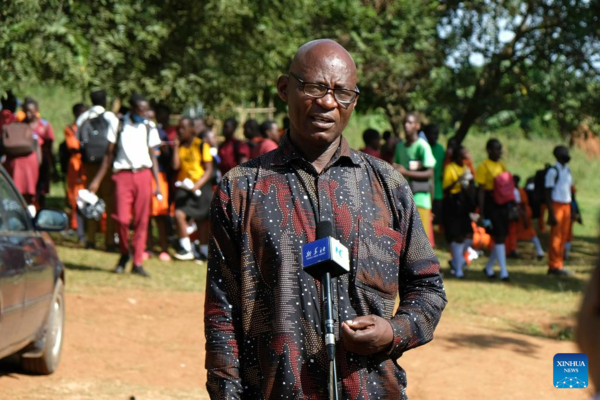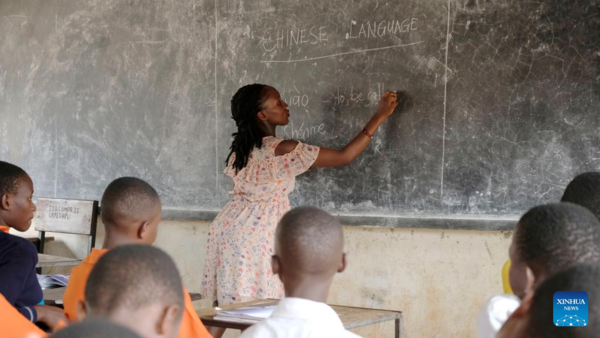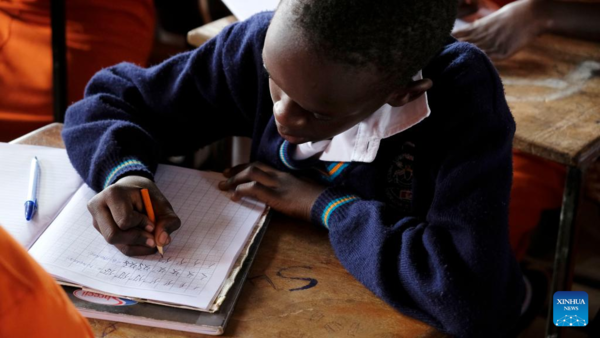Feature: Ugandan Teacher on Mission to Spread Chinese Language Teaching
 |
| Florence Nakijoba, a Chinese language teacher, interacts with students during a lesson at Entebbe Comprehensive Secondary School in Wakiso, Uganda, April 5, 2022. [Photo by Hajarah Nalwadda/Xinhua] |
WAKISO, Uganda, April 11 (Xinhua) — "Ni hao," students in Kitoro, a tiny village on the shores of Lake Victoria in the central Ugandan District of Wakiso, chorused as they responded to greetings from their Chinese language teacher, Florence Nakijoba.
Murmurs of students passing by, mimicking their peers, indicate a new wave of youngsters in the school eager to learn Chinese, the latest foreign language that was included in the school curriculum by the government back in 2019.
Nakijoba, 26, has been a proponent of this at Entebbe Comprehensive Secondary School, one of the government schools selected to teach the Chinese language.
"I always wanted to be a linguist, learning different languages, and Chinese is one of them," she told Xinhua in a recent interview.
Nakijoba was teaching Luganda and computer studies in 2019, before she took a nine-month training course in Chinese language teaching, as the government rolled out Mandarin in the school curriculum.
"I was very scared at first, but with time I got used to the language," she said. "By the end of nine months, I had reached level four."
In her class of about 90 students, Nakijoba teaches intonations, tenses and sentence construction of Mandarin.
The class, which is composed of students in their early teenage years, is still at the elementary level of learning the language.
Some students said that learning the Chinese language is one of the ways of widening their opportunities, especially as the Asian country deepens its ties with Africa.
Charles Bwebale, one of the students, said being multilingual widens one's opportunities.
"We hear China is one of the successful countries in the world, so when you know Chinese, you can engage them, you can do business (with the Chinese)," he said.
Ephraim Muwonge, deputy headmaster of the school, told Xinhua that parents have embraced the idea of their children learning the Chinese language, one of the sure ways of deepening the people-to-people relations between Uganda and China.
"We should teach Chinese," he said. "At the end of it, we shall benefit."
Nakijoba has extended Chinese language teaching beyond the school premises, offering online lessons for some learners.
She said that online learning was at its height during the lockdown last year as the country grappled with the COVID-19 pandemic. Many parents put their children on online Chinese language learning programs.
One major highlight of her Chinese language tutoring came earlier this year, Nakijoba said, when she was tasked with teaching Chinese songs to Ugandan musicians who were preparing for a Lunar New Year performance.
Back home, Nakijoba's siblings and parents are all excited that she speaks and teaches Chinese.
"My parents, up to now, still cannot believe I can speak Chinese," she said.
 |
| Ephraim Muwonge, deputy headmaster of Entebbe Comprehensive Secondary School, speaks in an interview with Xinhua in Wakiso, Uganda, April 5, 2022.[Photo by Hajarah Nalwadda/Xinhua] |
 |
| Florence Nakijoba, a Chinese language teacher, teaches during a lesson at Entebbe Comprehensive Secondary School in Wakiso, Uganda, April 5, 2022. [Photo by Hajarah Nalwadda/Xinhua] |
 |
| Charles Bwebale writes Chinese characters during a lesson at Entebbe Comprehensive Secondary School in Wakiso, Uganda, April 5, 2022. [Photo by Hajarah Nalwadda/Xinhua] |
(Source: Xinhua)
Please understand that womenofchina.cn,a non-profit, information-communication website, cannot reach every writer before using articles and images. For copyright issues, please contact us by emailing: website@womenofchina.cn. The articles published and opinions expressed on this website represent the opinions of writers and are not necessarily shared by womenofchina.cn.






.jpg)

 WeChat
WeChat Weibo
Weibo 京公网安备 11010102004314号
京公网安备 11010102004314号